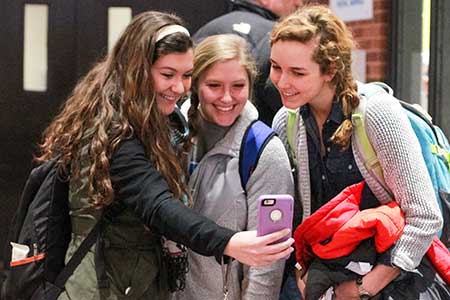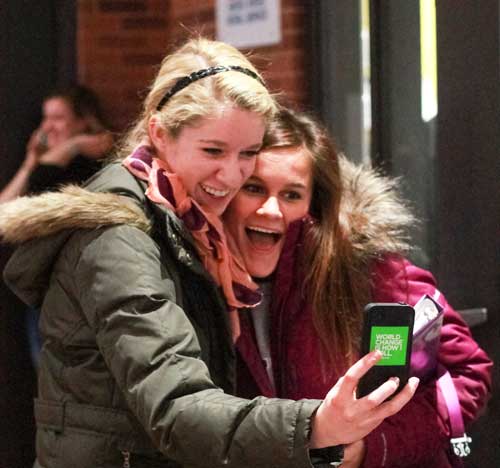
Taylor Chadduck (left), junior from O’Fallon, Mo., Hannah Weber (center), sophomore from Metropolis, Ill., and Carley Sommer (right), junior from O’Fallon, Mo., take a selfie.
The Murray State Women’s Center continued its fight this week to educate students about eating disorders, which affect more than 20 percent of women and 10 percent of men in universities nationwide.
Called Eating Disorders Awareness Week, Feb. 22-28 is set aside to promote knowledge of disorders in both men and women.
Abigail French, director of the Women’s Center, said there is focus throughout the week and the entire month of February to help encourage students to “think critically about what they believe about their bodies.”
College students who are adjusting to a more independent lifestyle are likely to engage in unhealthy eating and exercise habits.
“Unhealthy eating and exercise habits are often promoted, encouraged and even praised in the college population,” French said.
The Women’s Center, along with universities across the country, showed the fourth installment of “Killing Us Softly,” a short documentary challenging societal pressures for girls to match the ideal body type.
In an effort to increase attention, the Student Nutrition Association led a “Love Your Selfie” campaign Feb. 25 at a booth in the Curris Center, where students took selfies to symbolize self-love.

Marina White (left), sophomore from Shelbyville, Ky., and Grace Donaldson (right), sophomore from Eddyville, Ky., take a selfie which will later be hung in the Oakley Applied Science Building.
Caitlin Beyea, junior from Louisville, Ky., said the selfies taken at the booth were yet another way to generate awareness for the cause.
The selfies will be printed on a banner and hung in the Oakley Applied Science Building, continuing to create awareness among students even after the week ends.
The comparison between what the media portrays as a “normal” person and what a person really looks like creates issues with body image, Beyea said.
“(Eating disorders) come from peers, society and media,” she said. “Victoria’s Secret models are like a size negative two.”
The Women’s Center also plans to host a Southern Smash outside the Carr Health Building, which would allow students to tape pieces of paper with negative thoughts about their body to a scale and smash it with a baseball bat.
According to the Multi-Service Eating Disorder Association (MEDA), 91 percent of female college students have attempted to control their weight through dieting. According to MEDA, this dissatisfaction with one’s body image stems from unrealistic standards portrayed in the media, a concept that “Killing Us Softly” also brings to the public eye.
Over the past 30 years, the number of men facing body image issues increased from 15 percent to 43 percent, according to the National Eating Disorder Association website.
Men are pressured in the same way as women to maintain a certain body type, French said.
Unfortunately, men, like women, are often not educated on recognizing eating disorders and the help available to them.
Murray State offers several avenues for those seeking help for themselves or a friend struggling with an eating disorder.
French encouraged students to seek help from the Counseling Center or Women’s Center, both in the Oakley Applied Science Building and from Health Services.
Story by Amanda Grau, News Editor, Zachary Orr, Contributing writer
